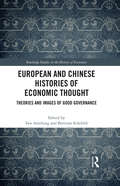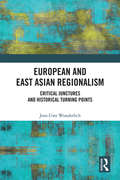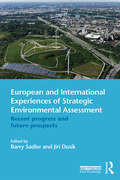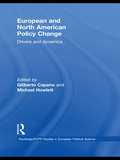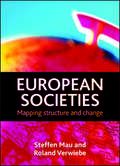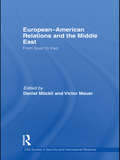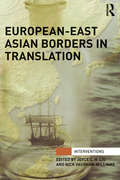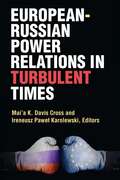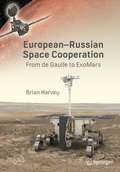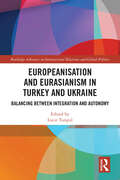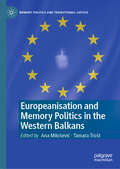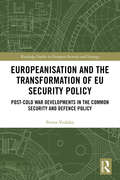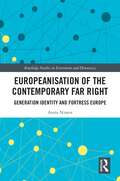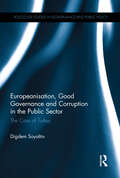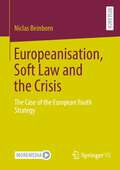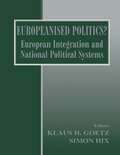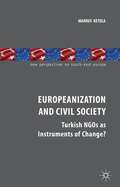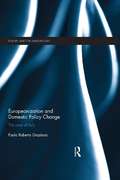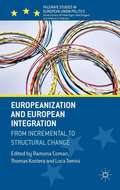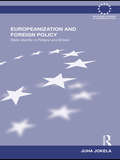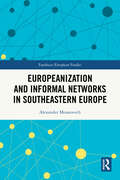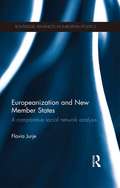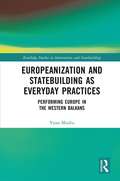- Table View
- List View
European and Chinese Histories of Economic Thought: Theories and Images of Good Governance (Routledge Studies in the History of Economics)
by Iwo AmelungThe Western literature on the history of Chinese economic thought is sparse, and comparisons with the history of Western economic thought even more so. This pioneering book brings together Western and Chinese scholars to reflect on the historical evolution of economic thought in Europe and China. The international panel of contributors cover key topics such as currency, usury, land tenure, the granary system, welfare, and government, and special attention is given to monetary institutions and policies. The problem of "good government" emerges as the unifying thread of a complex analysis that includes both theoretical issues and applied economics. Chinese lines of evolution include the problem of the agency of the State, its ideological justification, the financing of public expenditure, the role played by the public administration, and the provision of credit. The early radical condemnation of usury in the Near East and in the West gives way to theoretical justifications of interest-taking in early capitalist Europe; they, in turn, lead to advances in mathematics and business administration and represent one of the origins of modern economic theory. Other uniting themes include the relationship between metallic and paper money in Chinese and European experiences and the cross-fertilization of economic practices and ideas in the course of their pluri-millennial interactions. Differences emerge; the approach to the organization of economic life was, and still is, more State-centred in China. The editors bring together these analytical threads in a final chapter, opening wider horizons for this new line of comparative economic research which is important for the understanding of modern ideological turns. This volume provides valuable reading for scholars in the history of economic thought, economic history and Chinese studies.
European and East Asian Regionalism: Critical Junctures and Historical Turning Points
by Jens-Uwe WunderlichEmbedded in the evolving comparative regionalism literature, this book offers a systematic analysis of the factors positively and negatively influencing regional institution-building. The ruptures caused by the Eurozone crises, the coronavirus pandemic and by Brexit have renewed the interest in the impact of crises and critical junctures on regionalism here defined as regional institution-building. Drawing from critical juncture research and historical comparative analysis, this volume uses the cases of European and East Asian regional institution-building to systematically analyse institutional transformations during specific historical turning points and critical juncture moments. Wunderlich’s research offers an in-depth analysis of the interrelated drivers, spoilers and dissolvers of regional institution-building processes in Europe and East Asia, and addresses key questions including: Under what conditions does regionalism take hold? What is influencing the initial institutional design choices? What is the impact of historical experiences and well-entrenched norms and ideas? What are the roles of regional leaders? How do external factors influence regional institution-building? What turns a crisis into a critical juncture and are such junctures threats or opportunities? What accounts for variations in institutional responses to crisis events across different regional settings? This book will be a valuable resource for scholars of regionalism, region-building, regional governance and international relations of Europe and East Asia.
European and International Experiences of Strategic Environmental Assessment: Recent progress and future prospects
by Barry Sadler Jiří DusíkThis book brings together the latest thinking in Strategic Environmental Assessment (SEA) and considers the key question of whether the processes are having a positive impact on strategic decision making, both in Europe and worldwide. As governments move to develop green agendas, the book explores the challenges of working within national systems, as well as the strengths and weaknesses of sector-specific SEA. The importance of stakeholder engagement is considered, as is the question of how to turn NIMBYs into WIMBYs – that is, creating positive reasons to encourage development and allow local stakeholders to profit. In assessing ways in which the practice of SEA can provide a new agenda for the 21st Century, the chapters explore current and emerging approaches, procedures and methods, along with ways in which SEA can be linked with other planning tools. The role of research and academia is considered, and the book looks beyond the current status of SEA to address the question of how practitioners can capitalise on the potential of SEA to become integrated into high-level policy as a key element of climate change mitigation strategies. Each chapter is written by internationally renowned authors and based on many years of experience in the field. The book will be essential reading for forward-thinking practitioners and students of SEA.
European and International Media Law
by Jan OsterThis book is the first to incorporate current academic literature and case law on European, transnational, and international media law into a comprehensive overview intended primarily for students. It introduces the legal framework for globalised communication via mass media, and considers the transformative effect globalisation has had on domestic media law. Engaging case examples at the beginning of each chapter, and questions at the end, give students a clearer idea of legal problems and encourage them to think critically. A wide variety of topics - including media economics, media technology, and social norms concerning media publications - are discussed in relation to media law, and numerous references to case law and suggestions for further reading allow students to conduct independent research easily.
European and North American Policy Change: Drivers and Dynamics (Routledge/ECPR Studies in European Political Science)
by Giliberto CapanoThe issue of policy dynamics is a key one in policy studies and one which is particularly amenable to comparative policy research. This edited volume brings together some of the leading scholars in the field to examine the definition, conceptualization and operationalization of policy change. Drawing on empirical materials from a variety of longitudinal studies of Europe and North American policy development, this book assesses some of the major existing and unresolved issues currently challenging the discipline. It assesses existing approaches to understanding the multiplicity of drivers of policy change and provides a general map of the composite, multidimensional world of policies in action. The book features case studies on welfare reform, education reform, the World Bank, tobacco control policy, energy policy, agricultural policy, pension reform and the impact of public opinion. Features of the volume include: A focus on both the domestic and international drivers of policy change Contributions from internationally-renowned political scientists and policy experts Extensive qualitative data on policy change covering a range of different topics and countries This book will be of interest to students and scholars of public policy, public administration and public management, and political science programmes worldwide.
European societies: Mapping structure and change
by Steffen Mau Roland VerwiebeThis comprehensive textbook provides a thorough analysis of the nature of European societies across the expanded EU member states. Using a wealth of data, the authors compare the different dimensions of the territorial and social order of Europe and address a range of issues relating to Europeanisation and key topics such as inequality, migration, poverty, population and family, the labour market and education. Presented in a student friendly way, this book also helps unravel people's attitudes towards Europe, European integration and citizens of other European countries. It will be an essential read for under- and post-graduate students and academics of sociology, European studies, social stratification, social policy and political sciences.
European-American Relations and the Middle East: From Suez to Iraq (CSS Studies in Security and International Relations)
by Daniel MöckliThis book examines the evolution of European-American relations with the Middle East since 1945. Placing the current transatlantic debates on the Middle East into a broader context, this work analyses how, why, and to what extent European and US roles, interests, threat perceptions, and policy attitudes in the region have changed, relating to both the region as a whole and the two main issues analysed: Gulf Security and the Arab-Israeli Conflict. The contributors then go on to discuss the implications of these developments for Western policymaking. The volume makes four key contributions. First, it examines the subject matter from a truly transatlantic perspective, with all chapters adopting a bi- or multilateral approach, taking into account the views from both the US and individual European countries or the EC/EU collectively. Second, the book takes a long-term view, covering a series of crises and developments over the past six decades. Third, it has a systematic structure, with the predominantly chronological order of the chapters being geared towards depicting trends and evolutions with regard to the key themes of the book. Finally, the book builds bridges between historians and political scientists/analysts, as well as between experts of transatlantic relations and Middle East scholars. This book will be of great interest to students of transatlantic relations, the Middle East, US foreign policy, European politics, international history and IR in general. Daniel Möckli is a Senior Researcher at the Center for Security Studies (CSS), ETH Zurich. He is also the editor of CSS Analyses in Security Policy. Victor Mauer is Deputy Director and Head of Research of the Center for Security Studies (CSS), ETH Zurich, and Lecturer in the Department of Social Sciences and Humanities at ETH Zurich.
European-East Asian Borders in Translation (Interventions)
by Nick Vaughan-Williams Joyce C.H. LiuEuropean-East Asian Borders is an international, trans-disciplinary volume that breaks new ground in the study of borders and bordering practices in global politics. It explores the insights and limitations of border theory developed primarily in the European context to a range of historical and contemporary border-related issues and phenomena in East Asia. The essays presented here question, rather than assume, the various borders between inclusion/exclusion, here/there, us/them, that condition the (im)possibility of translating between histories, cultures and identities. Contributors suggest that the act of translation offers new ways of thinking about how border logics operate, taking on the concept of translation itself as border problematic and therefore raising questions of power and authority, such as who gets to act as a translator, or who benefits from the outcome. The book will appeal not only to upper-level students and scholars with a geopolitical-historical interest in East Asia, but also to those who work in the inter-disciplinary field of border studies and others with an interest more generally in translation and the extent to which theory ‘travels’ across time and space.
European-Russian Power Relations in Turbulent Times
by Ireneusz Pawel Karolewski Mai'a CrossThe Russia-Europe relationship is deteriorating, signaling the darkest era yet in security on the continent since the end of the Cold War. In addition, the growing influence of the Trump administration has destabilized the transatlantic security community, compelling Europe—especially the European Union—to rethink its relations with Russia. The volume editors’ primary goal is to illuminate the nature of the deteriorating security relationship between Europe and Russia, and the key implications for its future. While the book is timely, the editors and contributors also draw out long-term lessons from this era of diplomatic degeneration to show how increasing cooperation between two regions can devolve into rapidly escalating conflict. While it is possible that the relationship between Russia and Europe can ultimately be restored, it is also necessary to understand why it was undermined in the first place. The fact that these transformations occur under the backdrop of an uncertain transatlantic relationship makes this investigation all the more pressing. Each chapter in this volume addresses three dimensions of the problem: first, how and why the power status quo that had existed since the end of the Cold War has changed in recent years, as evidenced by Russia’s newly aggressive posturing; second, the extent to which the EU’s power has been enabled or constrained in light of Russia’s actions; and third, the risks entailed in Europe’s reactive power—that is, the tendency to act after-the-fact instead of proactively toward Russia—in light of the transatlantic divide under Trump.
European-Russian Space Cooperation: From de Gaulle to ExoMars (Springer Praxis Books)
by Brian HarveyThe story of European-Russian collaboration in space is little known and its importance all too often understated. Because France was the principal interlocutor between these nations, such cooperation did not receive the attention it deserved in English-language literature. This book rectifies that history, showing how Russia and Europe forged a successful partnership that has continued to the present day.Space writer Brian Harvey provides an in-depth picture of how this European-Russian relationship evolved and what factors—scientific, political and industrial—propelled it over the decades. The history begins in the cold war period with the first collaborative ventures between the Soviet Union and European countries, primarily France, followed later by Germany and other European countries. Next, the chapters turn to the missions when European astronauts flew to Russian space stations, the Soyuz rocket made a new home in European territory in the South American jungle and science missions were flown to study deep space. Their climax is the joint mission to explore Mars, called ExoMars, which has already sent a mission to Mars.Through this close examination of these European-Russian efforts, readers will appreciate an altogether new perspective on the history of space exploration, no longer defined by competition, but rather by collaboration and cooperation.
Europeanisation and Eurasianism in Turkey and Ukraine: Balancing between Integration and Autonomy (Routledge Advances in International Relations and Global Politics)
by Lucie TungulThis book analyses the impact of external actors, primarily the European Union (EU) and Russia, on democratisation and authoritarian tendencies in Ukraine and Turkey. The war in Ukraine will continue to affect patterns of cooperation and confrontation in the Black Sea region for years to come, critically undermining Russia as a viable alternative partner for deeper political and economic integration, but also revealing that the EU has only partially succeeded in stabilising its neighbourhood. In this volume, international contributors consider future EU and Russian strategy in the region and the impact on domestic and foreign policy in two countries seen by the EU as “disputed Europeans”. The book will appeal to those working on Eastern Europe and the Middle East, the EU and Russia, scholars of international relations, democratisation studies, East European politics and area studies, and Eurasian studies. It is also aimed at foreign policy analysts, journalists, policymakers and diplomats.
Europeanisation and Memory Politics in the Western Balkans (Memory Politics and Transitional Justice)
by Ana Milošević Tamara TroštThis volume explores how the process of European integration has influenced collective memory in the countries of the Western Balkans. In the region, there is still no shared understanding of the causes (and consequences) of the Yugoslav wars. The conflicts of the 1990s but also of WWII and its aftermath have created “ethnically confined” memory cultures. As such, divergent interpretations of history continue to trigger confrontations between neighboring countries and hinder the creation of a joint EU perspective. In this volume, the authors examine how these “memory wars” impact the European dimension - by becoming a tool to either support or oppose Europeanisation. The contributors focus on how and why memory is renegotiated, exhibited, adjusted, or ignored in the Europeanisation process.
Europeanisation and the Transformation of EU Security Policy: Post-Cold War Developments in the Common Security and Defence Policy (Routledge Studies in European Security and Strategy)
by Petros ViolakisThe aim of this study is to examine the extent to which the end of the Cold War led to Europeanisation in the Common Security and Defence Policy (CSDP). The analysis takes into consideration previous studies on Europeanisation and its impact on the transformation of national security and defence, and attempts to account for the development of Europeanisation and related mechanisms. These mechanisms, which have been described as framing mechanisms and negative integration, incorporate all the major relevant factors identified here (i.e. a common Strategic Culture, new security identity, domestic political decision-making, industrial base and defence-spending decline) that contributed to the realisation of the CSDP. The relevance of these factors for CSDP Europeanisation is examined through an historical and empirical analysis, and the relationship between the CSDP and North Atlantic Treaty Organization (NATO) is also explored. This approach facilitates analysis of the debate concerning the emergence of the CSDP and throws light on the political shift that led European Union (EU) leaders to support the CSDP. Another aspect of this study is the empirical examination of the dynamics and limitations of the European defence sector. The changes which took place in this sector facilitated the emergence of the CSDP and are therefore analysed in the light of globalisation issues, economies of scale, economic crises, military autonomy, new security strategy and Research and Development (R&D) impact. This book will be of interest to students of European security, EU politics, defence studies and International Relations.
Europeanisation of Private Enforcement of Competition Law: The Case of Albania
by Gentjan SkaraThis book argues that the European integration process (Europeanisation) is pushing the member states and candidate countries toward a greater convergence with the EU’s competition acquis. Through the transposition of the Directive 2014/104/EU, the member states have harmonised substantive and procedural rules, which is beneficial to individuals and enterprises because it provides a minimum protection across all member states. In addition, it is commonly agreed in academia that the prospect of EU membership brings positive domestic changes in the candidate countries. At the moment, Albania is waiting to open negotiations for the chapters of the EU acquis.Firstly, this book addresses the evolution of private enforcement at the European level by examining the objectives, modalities, and actors that contributed to the development of private enforcement. Secondly, it analyses the Directive 2014/104/EU and how the three selected EU member states have transposed the directive into their domestic legal system considering the discretion margin left by Article 288 TFEU and a minimum harmonisation level defined in the directive. Thirdly, it provides a historical overview of private enforcement in Albania and shows how the Albanian Competition Authority has addressed the transposition of the Directive 2014/104/EU.
Europeanisation of the Contemporary Far Right: Generation Identity and Fortress Europe (Routledge Studies in Extremism and Democracy)
by Anita NissenEuropeanisation of the Contemporary Far Right explores the role of transnational European identity in far-right mobilisation strategies. Focusing on the national members of two trans-European far-right coalitions – Generation Identity and Fortress Europe – the author explores the extent to which European far-right extra-parliamentary actors Europeanise their mobilisation. Drawing on social movement literature, the book argues that national extra-parliamentary actors’ Europeanisation processes are influenced by their political and discursive opportunities and resources. Focusing on the groups’ mobilisation during the ‘refugee crisis’ (2015–2017), the analysis considers the groups’ frames, collective action, and coalition-building in the period, finding that the depth of the groups’ resources particularly affects their capacity to mobilise. This book will be of interest to scholars, students, and civil society actors in fields related to the far right, European studies, social movements, and migration.
Europeanisation, Good Governance and Corruption in the Public Sector: The Case of Turkey (Routledge Studies in Governance and Public Policy)
by Digdem SoyaltinWhen and to what extent external actors, especially the EU, contribute to induce legal and administrative changes and help domestic authorities address the disconnect between good governance standards and corrupt practices? Comparing external promotion of anti-corruption norms and provisions in civil administration, public finance management and public procurement in Turkey this book identifies the domestic conditions under which external actors can affect real-world outcomes. Providing a comprehensive, empirical account of Turkey’s fight against corruption, the book’s cross-sectoral analysis explores the power relations between major political actors and bureaucratic state elites, and examines how structural administrative factors filter external pressure for anti-corruption reforms and determine the prospects for institutional change in the Turkish public sector. This welcome addition to literature on Europeanisation and external good governance promotion makes an important contribution to the academic and policy debate regarding the "politics" of anti-corruption reforms in Turkey.
Europeanisation, Soft Law and the Crisis: The Case of the European Youth Strategy
by Niclas BeinbornInfluence of “hard” law on national policies still is a central topic in Europeanisation research. One aspect often overlooked is the impact of “soft” law instruments such as the “Open Method of Coordination” (OMC). Through the OMC all member states agree on common goals and exchange “best practices” to improve policy coordination in a certain area without the obligation (how) to design policies. OMC impacts in individual member states have been studied extensively, yet a comparative perspective explaining their variance is lacking. This study by Niclas Beinborn tries to fill this gap by analysing the different impacts of a recent OMC: the European Youth Strategy 2010 (EUYS). His analysis is twofold: in a first step he applies theory-driven fuzzy-set QCA to a novel dataset depicting the variance of national activities around the EUYS. As causalities remain unclear, in a second step he presents an innovative analysis framework encompassing two dimensions – national motivation and relative openness to implement non-binding EU law – to define ideal types of OMC adaptation. Case studies on the EUYS in Germany and Ireland proof the potential of this framework to explain why and how OMCs work (differently).
Europeanised Politics?: European Integration and National Political Systems
by Klaus H. Goetz Simon HixThis comparative examination of the impact of European integration on the politics and government of EU member states covers the parties, the legal system, voters and public administration.
Europeanization and Civil Society
by Markus KetolaDo NGOs strengthen Turkey's efforts at Europeanization and democratization or do they use EU funding to serve other interests?This book offers a critical investigation of the relationship between Turkish NGOs and the European Union (EU) and a nuanced assessment of the opportunities and limitations to fashioning social change by funding NGOs.
Europeanization and Domestic Policy Change: The Case of Italy (Europe and the Nation State)
by Paolo R. GrazianoThis book examines the impact of Europeanization on the domestic politics of EU member states, focussing on agricultural policy, cohesion policy and employment policy with a detailed comparative case study on Italy. Though a founding member, Italy has often had an uneasy relationship with the EU and found it difficult to be influential in EU politics and to comply effectively with EU policies and institutional pressures. The main focus of this book is the analysis of Italy-EU relationship from a policy-based perspective, adopting the conceptual lenses developed by Europeanization research. By looking at the evolution of agricultural, regional cohesion and employment policy the book shows how the politics of adaptation have brought Italy closer to Europe in the past twenty years and further highlights the impact of the EU-Italy relationship on domestic institutions and politics. The author explains that even though Italy has increasingly learned to respect EU membership requirements, its influence over agenda setting within the EU remains limited. Europeanization and Domestic Policy Change will be of interest to students and scholars of European Politics, Europeanization, comparative politics and Italian politics.
Europeanization and European Integration
by Ramona Coman Thomas Kostera Luca TominiAfter two decades of research into the impact of the EU on domestic politics and policies, this book explores the relationship between Europeanization and EU integration. It argues that Europeanization should be considered as a stage in the development of EU integration as well as questioning the notion of incremental Europeanization.
Europeanization and Foreign Policy: State Identity in Finland and Britain (Routledge Advances in European Politics)
by Juha JokelaThis book examines the relationship between the European Union (EU) and its member states by analysing how the process of integration in the field of foreign policy is shaping member states' identities. Focusing on the mutually constitutive aspects of the relationship between the EU and its member states, Jokela argues that we need discourse analytic and comparative tools for analysing foreign policy in the EU context and draws on the contributions of poststructural international relations. Providing empirically rich and comparative case studies that explore the impact of europeanization of foreign and security policy on Finnish and British foreign policy discourses as well as these states’ identities, Jokela generates detailed knowledge about the interplay of national and supranational foreign policy discourses. Making an important contribution to europeanization studies, foreign policy analysis and discourse analysis, this book will be of strong interest to students and scholars of European politics, comparative politics, foreign policy and interntional relations.
Europeanization and Informal Networks in Southeastern Europe (ISSN)
by Alexander MesarovichEuropeanization and Informal Networks in Southeastern Europe considers the impact of political culture, including informal rules which regulate political behaviour, on formal political processes. Exploring the EU accession processes of Slovenia, Croatia, and Serbia, the author identifies how the working and social culture of political elites enabled and/or constrained the ability of the respective legislatures to pass the reforms necessary to become members of the EU.The innovative approach quantifies informality at the elite level, taking a rigorous, multi-methods approach to identifying the sometimes-subtle impact of informal cultures on formal political processes. In doing so, it demonstrates the added value from studying informality by providing a richer understanding of the factors which help motivate and drive political action, and which may be invisible to an outside observer. By examining features such as the connectedness of individuals and key committees, Mesarovich finds that hierarchical network structures can both accelerate and interfere with reform processes under different conditions.This book advances the field of Europeanization both within the framework of accession and more broadly, by highlighting network-level and individual factors which can deeply impact state-wide political outcomes, and will be of primary interest to an academic audience interested in the region, EU studies, Social Network Analysis, and regional politics.
Europeanization and New Member States: A Comparative Social Network Analysis (Routledge Advances in European Politics)
by Flavia JurjeThis book examines the Europeanization of the polity and politics of a new EU Member State. Using social network analysis in a comparative research design, it provides a systematic analysis of the effects of Europeanization on the institutions, policy processes, power constellation and conflict among national elites. Providing a detailed case study on Romania in comparative perspective, the book analyses the impact of the European Union integration process on decision-making in six policy networks to develop a cross-sector and cross-time comparative analysis. It explores mandatory EU requirements in the area of immigration and asylum and the implementation of various EU directives during the negotiation period as well as post-integration. It also examines soft/non-mandatory Europeanization in the social sector and investigates a third control case on a domestic reform, fiscal decentralization in the education sector, where the EU influence is absent. Measuring the impact of Europeanization both before and after integration, this book has considerable implications for the study of current and future candidate states. It will be of interest to students and scholars of EU enlargement, Europeanization studies, European politics, especially Central and Eastern European politics.
Europeanization and Statebuilding as Everyday Practices: Performing Europe in the Western Balkans (Routledge Studies in Intervention and Statebuilding)
by Vjosa MusliuThis book provides a critical understanding of Europeanization and statebuilding in the Western Balkans, using the notion of everyday practices. This volume argues that it is everyday and mundane events that provide the entry points to showcase a broader set of practices of Europeanization in countries outside the EU. It does this by tracing notions of Europeanization in the everyday statebuilding of Kosovo, Europe Day celebrations in Bosnia and Herzegovina, urban politics in Tirana, and space and place making in Skopje. In doing so, the book shows that everyday events tell us that as much as it is about changing structures, institutions, and economic models, Europeanization is also about changing behaviours and ideas in populations at large. At the same time, the work shows that countries outside the EU use everyday events to perform their belonging to Europe. This book will be of much interest to students of European Studies, Balkan politics, statebuilding, and International Relations generally.
